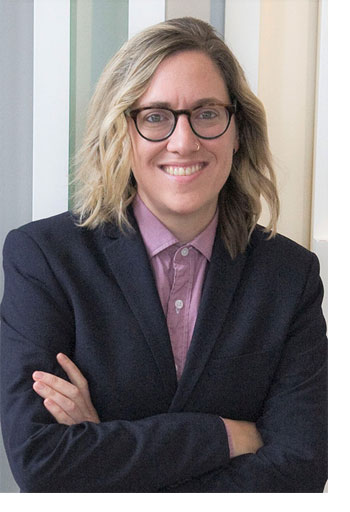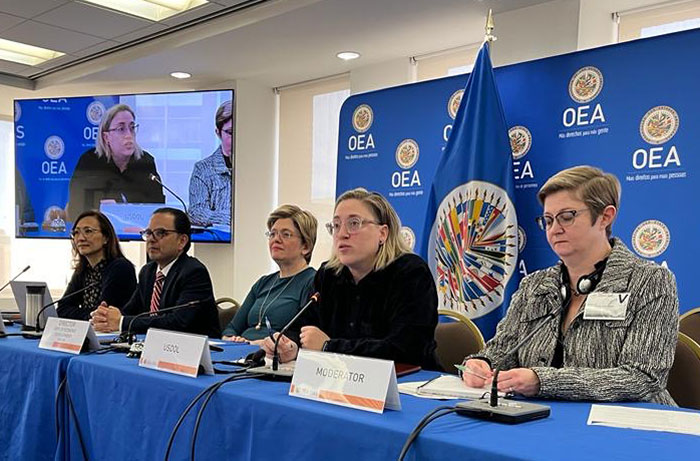 Carolina is a foreign affairs professional with 15 years of experience. She has conducted in-depth policy analysis and development, provided expert advice and recommendations, led cross-cultural engagement and negotiation with stakeholders, and monitored trade partners’ compliance with international human rights and worker rights. She's a people person who enjoys building relationships and coalitions, is naturally inquisitive and has a passion for learning and innovating.
Carolina is a foreign affairs professional with 15 years of experience. She has conducted in-depth policy analysis and development, provided expert advice and recommendations, led cross-cultural engagement and negotiation with stakeholders, and monitored trade partners’ compliance with international human rights and worker rights. She's a people person who enjoys building relationships and coalitions, is naturally inquisitive and has a passion for learning and innovating.
As Senior Advisor on Western Hemisphere Affairs, she serves as the primary expert on labor and employment policies and programs and manages bilateral relationships with key countries in the region.
Carolina holds degrees from the University of Michigan-Ann Arbor and the American University Washington College of Law. In 2020, Carolina was recognized among 40 LGBTQIA+ national security and foreign policy leaders by Out in National Security and New America and listed among the top 40 Latino experts in this field. Carolina was born and raised in Uruguay and is a native Spanish speaker and proud first-generation American.
- As an immigrant to the United States, you bring a unique and valuable perspective to the work. How did your journey to becoming a U.S. citizen shape your work at ILAB?
Starting out as an immigrant and ending up as a public servant is an incredible journey. As immigrants to the United States, we must earn our citizenship and our right to be here. We must prove our love, gratitude, and loyalty to the United States. For that reason, it seems fitting for naturalized citizens like me to be able to represent the United States abroad. We embody the American dream, we earned our place here, and we are effective “ambassadors” to other countries.
As an international relations professional and public servant working in the Western Hemisphere, I bring my immigrant perspective to everything I do at work. Having spent almost half my life in Uruguay and a little over half my life in the United States, I can think in both languages, navigate both cultures, and leverage that understanding to build deeper relationships with counterparts in the hemisphere.
- How has embracing your identity enriched your experience as a professional? What values should employers and colleagues consider in creating a community of belonging?
I haven't always embraced my identity as an LGBTQI+ person, and with good reason. Studies have shown that LGBTQI+ people face disproportionate amounts of discrimination, including in the world of work. But, something changed when I began working for the federal government, realizing I had certain protections I had not enjoyed before. I decided if I could not be myself at DOL, I would not be able to be myself anywhere. Along with dressing less traditionally and being more open about my personal life, I also found myself to be more confident and ready to lead. Being able to bring my whole self to work has allowed me to get closer to realizing my full potential. And I think that has also enriched my team and organization.
I would tell employers to think about making their workplaces as welcoming as possible to people with different backgrounds and seek constructive ways to celebrate diversity. When I represent the United States in international forums or visits, it always strikes me how uniquely diverse our delegations are. When I engage with Latin American countries, as someone born and raised in Uruguay, I know how they think, how they see us, and what resonates with them because I share that culture and some of those values. As a diverse workforce, we bring unique aspects of ourselves that are a true asset to our government, especially working in the international labor world. - You were in Brazil for the U.S.-Brazil Labor Dialogue recently. What were the highlights of this engagement and the most defining moment?
It's a historic moment for the bilateral relationship between the United States and Brazil—especially on labor rights cooperation—with the recent announcement of the Partnership for Workers’ Rights by Presidents Biden and Lula. Sitting across from our Brazilian colleagues and realizing how well we align on priorities and how much we can accomplish together was incredibly exciting. - You took a non-linear career path. What advice would you give to people new to international relations who may need to follow a similar path in their careers?
I would have chosen a more direct path if I could have, but I was an immigrant student who had to start her career over. I worked nights full-time while going to community college for years before being able to transfer to a four-year college on a scholarship, and I was 27 by the time I started law school. I wanted to work in international human rights but did not know where to begin. It's easy sometimes to forget that I have been at the Department of Labor for a decade now, working in the field that I studied to work in since I began community college. It was not a straight line, but almost no one has the privilege of a direct path to their dream job. What matters is being strategic about what career path to take and building a narrative about that career path that employers can understand. When I was starting in the international field, I talked to as many people as I could who held the positions or worked at organizations I saw myself in, and I would ask them what skills and experience would make me a competitive applicant, what would they pay attention to in resumes they reviewed, what they noticed made them and their colleagues successful in those positions. Second, I specifically sought employment opportunities that would help me develop those skills and subject matter expertise. Third, I always found that my time was best spent trying to improve at what I was already good at rather than trying to be good at everything. My advice would be to be strategic and not lose sight of the ultimate goal.
